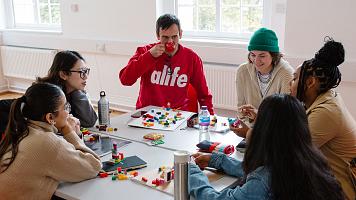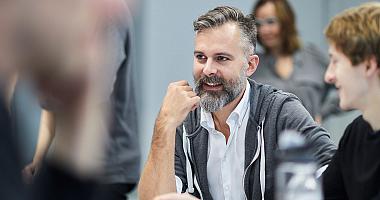PGCert
Museums and Galleries in Practice
Content navigation menu
Why study PGCert Museums and Galleries in Practice at Goldsmiths
This programme will cover sponsorship and marketing, audience development, regeneration and partnerships, and commerce/merchandise, giving a detailed insight into the ways that museums and galleries are managed.
- Perhaps you already work in a museum or gallery and want some CPD experience. Or maybe you work in a different area but are thinking about a change of career. Either way this programme is ideal for you.
- Through a combination of lectures, seminars, outside visits, interviews, projects, workshops and presentations you'll explore and develop your understanding of how museums and galleries work and their role in wider culture.
- This programme takes the view that museums and galleries are unique organisations and cannot be viewed in the same way as other start-up businesses or commercial ventures. Instead, it's a progressive way of developing commercial strands within the public sector. You'll be encouraged to explore different activities within museums and galleries, identify the target audiences for whom activities or resources have been developed, and the type of income raised.
- The programme will use case studies of large-scale public/cultural projects like the Unilever series in Tate Modern's Turbine Hall, and the Fourth Plinth project in Trafalgar Square. Many of the sessions will take place in a museum or gallery (for example, Tate, the V&A, National Gallery), where you'll be able to carry out practical research. You'll also be able to meet and engage with potential professional contacts in different departments.
Contact the department
If you have specific questions about the degree, contact the Programme Convenor.
Length
Two 10-week courses taken one afternoon a week
Department
What you'll study
The programme is made up of two 30-credit modules:
| Module title | Credits |
|---|---|
| Exploring the Field of Museums and Galleries | 30 credits |
| Museums and Galleries in Culture | 30 credits |
You can start the course at either point in the year.
The programme aims to develop the skills of those who are thinking of embarking on a career in museums and galleries and those already engaged in professional museum roles.
Each module is designed to further your understanding about the museums and gallery sector and to equip you with the necessary tools to work in museums and galleries.
Teaching style
Taught sessions and lectures provide overviews of themes, which students are encouraged to complement with intensive reading for presentation and discussion with peers at seminars.
Assessments build on lectures and seminars, so students are expected to attend all taught sessions to build knowledge and their own understanding of their chosen discipline.
Careers
This programme covers many different areas and roles within museums and galleries, including:
- Marketing
- Communications
- Programming
- Fundraising/development
You'll therefore finish the course with a good understanding of these areas and how they interact with each other. This could prove to be excellent experience if you're keen to obtain employment or a placement in these sectors in future.
The course is also ideal continuing professional development (CPD) for anyone already working in a museum or gallery.
Skills
By completing this programme you'll be able to:
- Critically evaluate the main theories and concepts underpinning gallery and museum studies
- Analyse complex museum structures and the way that cultural organisations operate
- Understand how museums and galleries attract sponsorship, develop marketing strategies, and communicate their brands
- Network with gallery and museum professionals
- Develop and complete an independent research project
Entry requirements
You should normally have (or expect to be awarded) an undergraduate degree of at least second class standard in a relevant/related subject.
You might also be considered if you have at least two years' professional experience working in the creative industries.
International qualifications
We accept a wide range of international qualifications. Find out more about the qualifications we accept from around the world.
If English isn’t your first language, you will need an IELTS score (or equivalent English language qualification) of 7.0 with a 7.0 in writing and no element lower than 6.5 to study this programme. If you need assistance with your English language, we offer a range of courses that can help prepare you for postgraduate study.
Fees and funding
Annual tuition fees
These are the PG fees for students starting their programme in the 2025/2026 academic year.
- Home - Part-time: £3750
If your fees are not listed here, please check our postgraduate fees guidance or contact the Fees Office, who can also advise you about how to pay your fees.
It’s not currently possible for international students to study part-time under a student visa. If you think you might be eligible to study part-time while being on another visa type, please contact our Admissions Team for more information.
If you are looking to pay your fees please see our guide to making a payment.
Funding opportunities
Explore the Goldsmiths scholarships finder to find out what funding you may be eligible for.
Paying your fees
Find out about paying your tuition fees.
If you are a UK student you may be eligible for a postgraduate loan.
Find out more about postgraduate fees and explore funding opportunities. If you're applying for funding, you may be subject to an application deadline.
Additional costs
In addition to your tuition fees, you'll be responsible for any additional costs associated with your course, such as buying stationery and paying for photocopying. You can find out more about what you need to budget for on our study costs page.
There may also be specific additional costs associated with your programme. This can include things like paying for field trips or specialist materials for your assignments. Please check the programme specification for more information.
How to apply
You apply directly to Goldsmiths using our online application system.
To complete your application, you will need to have:
- Details of your academic qualifications
- The email address of your referee who we can request a reference from, or alternatively a copy of your academic reference
- Copies of your educational transcripts or certificates
- A personal statement
You'll be able to save your progress at any point and return to your application by logging in using your username/email and password.
Read our guide to applying for a postgraduate degree at Goldsmiths.





